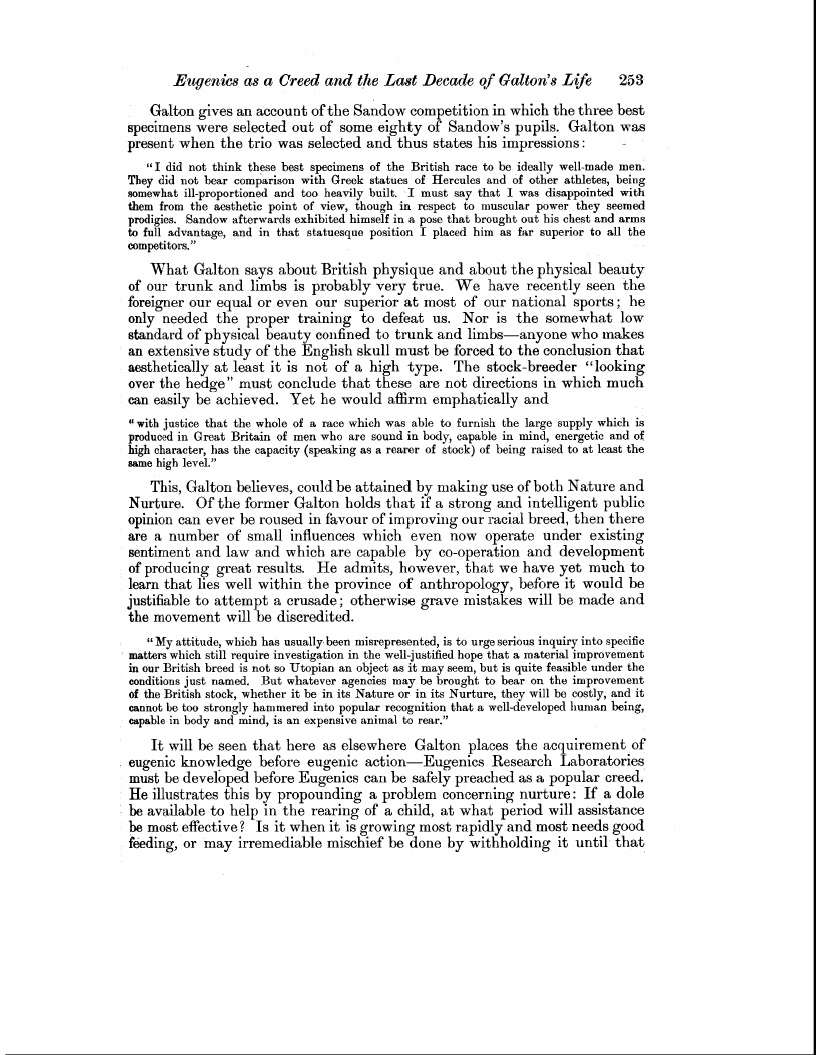| ||||||

OCR Rendition - approximate
Eugenics as a Creed and the Last Decade of Galton's Life 253 Galton gives an account of the Sandow competition in which the three best specimens were selected out of some eighty of Sandow's pupils. Galton was present when the trio was selected and thus states his impressions "I did not think these best specimens of the British race to be ideally well-made men. They did not bear comparison with Greek statues of Hercules and of other athletes, being somewhat ill-proportioned and too heavily built. I must say that I was disappointed with them from the aesthetic point of view, though in respect to muscular power they seemed prodigies. Sandow afterwards exhibited himself in a pose that brought out his chest and arms to full advantage, and in that statuesque position I placed him as far superior to all the competitors." What Galton says about British physique and about the physical beauty of our trunk and limbs is probably very true. We have recently seen the foreigner our equal or even our superior at most of our national sports ; he only needed the proper training to defeat us. Nor is the somewhat low standard of physical beauty confined to trunk and limbs-anyone who makes an extensive study of the English skull must be forced to the conclusion that aesthetically at least it is not of a high type. The stock-breeder "looking over the hedge" must conclude that these are not directions in which much can easily be achieved. Yet he would affirm emphatically and "with justice that the whole of a race which was able to furnish the large supply which is produced in Great Britain of men who are sound in body, capable in mind, energetic and of high character, has the capacity (speaking as a rearer of stock) of being raised to at least the same high level." This, Galton believes, could be attained by making use of both Nature and Nurture. Of the former Galton holds that if a strong and intelligent public opinion can ever be roused in favour of improving our racial breed, then there are a number of small influences which even now operate under existing sentiment and law and which are capable by co-operation and development of producing great results. He admits, however, that we have yet much to learn that lies well within the province of anthropology, before it would be justifiable to attempt a crusade; otherwise grave mistakes will be made and the movement will be discredited. "My attitude, which has usually: been misrepresented, is to urge serious inquiry into specific matters which still require investigation in the well-justified hope that a material improvement in our British breed is not so Utopian an object as it may seem, but is quite feasible under the conditions just named. But whatever agencies may be brought to bear on the improvement of the British stock, whether it be in its Nature or in its Nurture, they will be costly, and it cannot be too strongly hammered into popular recognition that a well-developed human being, capable in body and mind, is an expensive animal to rear." It will be seen that here as elsewhere Galton places the acquirement of eugenic knowledge before eugenic action-Eugenics Research Laboratories must be developed before Eugenics can be safely preached as a popular creed. He illustrates this by propounding a problem concerning nurture : If a dole be available to help in the rearing of a child, at what period will assistance be most effective? Is it when it is growing most rapidly and most needs good feeding, or may irremediable mischief be done by withholding it until that
|